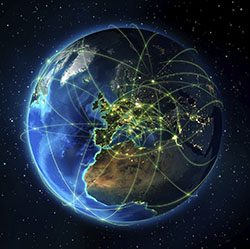Digital Europe: the ‘third industrial revolution’
The digital era can transform our new economic system into a new reality called the collaborative commons, according to Rifkin. Be quite sure that this is no minor event. In fact, it’s the first new economic paradigm to emerge since the advent of capitalism and socialism in the early 19th century. And this, the ‘third industrial revolution’, is underpinned by the digitalization of every aspect of our lives. The zero marginal cost society If you own your own business, you are probably familiar with the term ‘marginal costs’. These are the costs for producing additional goods and services after fixed costs are covered. Rifkin says that the technology revolution that we are experiencing is so powerful that it could reduce marginal costs to zero. He cites examples of individuals harnessing energy from the sun or wind or producing any manner of goods using 3D printers. Once we have the equipment that digitalization promises, we can effectively become ‘pro-sumers’ (producer-consumers), and this changes everything. Digital Europe Rifkin called on the EU to help make the collaborative commons a reality for Europeans. He was adamant that the digitalization of the EU within the context of a true single market would put everyone in the EU back to work. In fact, he maintained, transforming our communication, transport and energy grids would ‘keep industry busy for 40 years’. ‘The only industry that I can’t find a job for’, he lamented, ‘is the oil industry’. Rifkin said that the billions of euro that the EU invests in infrastructure goes on ‘old industry’ that is in an end game. He added, ‘If the EU puts even half of this into new infrastructure for Digital Europe then we are on our way. And this can be done in the morning’. Digital for the planet Rifkin is certain that the zero marginal cost society will not only bring efficiency and freedom to citizens, it will also help address one of the great challenges of our time: climate change. ‘I’m terrified’, he explained. ‘Real time climate change is here. We are now in the sixth extinction event of life. We could lose up 70 % of species by the end of the century. We have no time left – zero marginal costs is the ultimate metric to address climate change. If we can have optimum efficiency, use less of earth’s resources and what we do produce is shared over and over and over, we will lessen burden on planet. We can begin to democratise economic life on the planet. It will be a new journey … Hopefully, on time to heal the planet.’ For more information, please visit: http://ec.europa.eu/digital-agenda/en/dad14eu#Article(opens in new window)
Countries
Belgium



